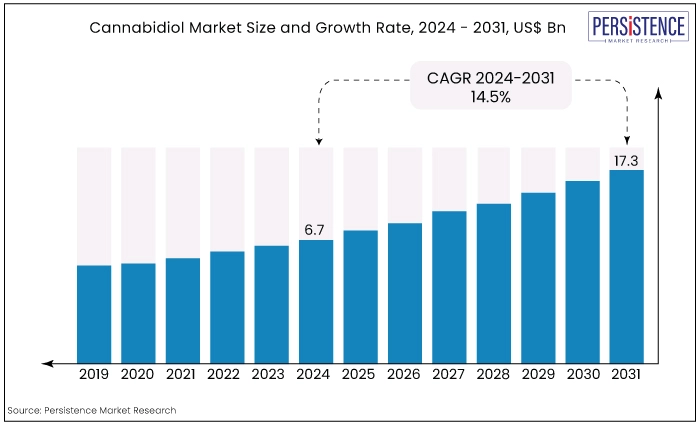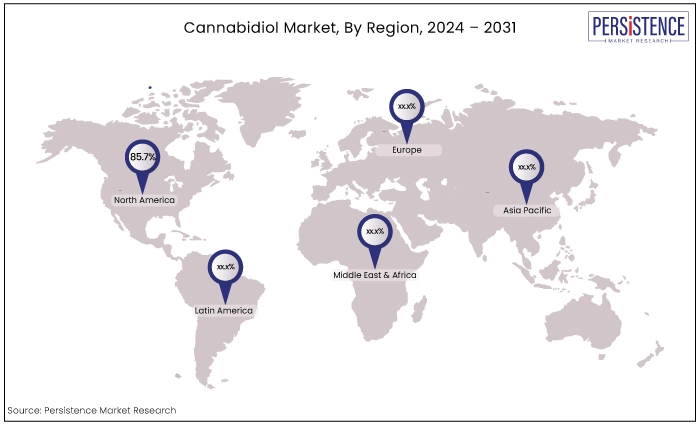Industry: Healthcare
Format: PPT*, PDF, EXCEL
Delivery Timelines: Contact Sales
Report Type: Ongoing
Report ID: PMRREP34668
The global cannabidiol market size is expected to rise from US$6.7 Bn in 2024 to US$17.3 Bn by the end of 2031. The market is anticipated to secure a CAGR of 14.5% during the forecast period from 2024 to 2031.
Key Highlights of the Market
|
Attributes |
Key Insights |
|
Market Size (2024E) |
US$6.7 Bn |
|
Projected Market Value (2031F) |
US$17.3 Bn |
|
Forecast Growth Rate (CAGR 2024 to 2031) |
14.5% |
|
Historical Growth Rate (CAGR 2019 to 2023) |
13.2% |
Consumer awareness of the potential health benefits of CBD, such as its purported anti-inflammatory, analgesic, and anxiety-reducing properties, continues to drive demand.
As more consumers seek natural alternatives to traditional pharmaceuticals, CBD products have gained popularity in wellness and health-conscious markets. Users find cannabidiol oral solution convenient and easy to dose compared to other forms of CBD products like oils or capsules
Cannabidiol products are increasingly integrated into mainstream retail channels, including supermarkets, beauty stores, and wellness centers.
Major retailers and e-commerce platforms are stocking CBD products, thereby expanding accessibility and consumer reach. This trend further validates CBD's market appeal and contributes to market growth.
The CBD market is experiencing global expansion, with North America leading in market size and Europe following closely behind.
Emerging markets in Asia Pacific, and Latin America are also witnessing increasing adoption of CBD products, driven by evolving regulatory landscapes and growing consumer interest in natural health solution.
Consumer interest in natural health and wellness products has surged, with CBD gaining traction for its perceived therapeutic benefits.
CBD is widely recognized for its potential to alleviate symptoms associated with anxiety, pain, insomnia, and inflammation without the psychoactive effects of THC, making it appealing to a broad demographic.
The driving forces behind the cannabidiol market include increasing consumer demand driven by health and wellness trends, supportive regulatory environments that foster industry growth, and the diversification of product offerings that appeal to a broad audience seeking natural alternatives for health management and overall well-being.
As research continues to uncover new potential applications and benefits of CBD, the market is poised to continue its growth trajectory, positioning CBD as a prominent player in the global health and wellness industry.

The CBD market has seen increased investment from both established players and new entrants looking to capitalize on the growing market opportunity. The period from 2019 to 2023 represents a dynamic phase of growth and evolution for the Cannabidiol Market.
Key drivers such as increasing consumer acceptance, regulatory advancements, product diversification, and strategic investments have collectively propelled the market forward, setting the stage for continued expansion and innovation in the years ahead. The market recorded a CAGR of 13.2% during the historical period.
The CBD market is anticipated to benefit from further regulatory clarity and standardization across global markets. Continued legalization efforts and regulatory frameworks will provide a stable foundation for market participants, encouraging investment, innovation, and market expansion.
Consumer awareness and acceptance of CBD's potential health benefits will continue to rise, supported by ongoing education campaigns and positive media coverage.
Growing interest in natural health remedies and holistic wellness solutions will drive demand for CBD products across demographic groups, including younger consumers seeking preventive healthcare and aging populations managing chronic conditions. The market is expected to record a CAGR of 14.5% during the forecast period from 2024 to 2031.
Expansion of Product Offerings and Innovation
The expansion of product offerings and continuous innovation in CBD products represent another crucial driver for cannabidiol market growth.
Initially dominated by CBD oils and tinctures, the market has diversified significantly to include a wide array of product categories such as capsules, edibles, beverages, skincare products, pet supplements, and even pharmaceutical formulations.
The diversification caters to diverse consumer preferences and lifestyles, making CBD accessible across various retail channels, including pharmacies, health food stores, online platforms, and specialty CBD shops.
Advancements in extraction technologies, formulation techniques, and product delivery systems have also contributed to product innovation and improved efficacy.
Nano-emulsion technology, for instance, enhances the bioavailability of CBD, allowing for faster absorption and increased therapeutic effects.
Manufacturers are increasingly focusing on organic and sustainable practices, ensuring product purity and environmental stewardship, which resonates well with eco-conscious consumers.
Increasing Consumer Awareness and Demand for Wellness Products
Another key driver for the CBD market is the rising consumer awareness and demand for natural wellness products. There is a growing preference among consumers for holistic health solutions that offer therapeutic benefits without the side effects associated with pharmaceuticals.
People are becoming more proactive about their health, focusing on preventative measures rather than just treating illnesses. CBD products are seen as potential tools for promoting relaxation, reducing stress, and improving overall well-being, aligning with this preventative approach.
The CBD market offers a diverse range of products catering to different wellness needs. This includes edibles, topicals, beverages, and even cosmetics, allowing consumers to choose a delivery method that suits their preferences.
CBD, known for its potential anti-inflammatory, analgesic, anxiolytic, and neuroprotective properties, has gained popularity as a natural remedy for various health conditions such as anxiety, chronic pain, insomnia, and skin disorders.
Quality Control and Consumer Safety Concerns
One of the key restraints for the CBD market is the issue of product quality control and consumer safety.
Given the rapid proliferation of CBD products in the market, there is a concern about inconsistent product quality, inaccurate labeling, and potential contamination with harmful substances such as pesticides, heavy metals, and residual solvents.
The lack of standardized testing protocols and quality assurance measures across the industry exacerbates these risks, posing health hazards to consumers and undermining trust in CBD products.
The absence of federal oversight in some markets allows for the proliferation of unregulated CBD products sold through online platforms and unlicensed retailers.
The products may not undergo rigorous testing or adhere to good manufacturing practices (GMP), increasing the likelihood of substandard products entering the market and reaching consumers.
Regulatory Uncertainty, and Compliance Challenges
The regulatory uncertainty and inconsistency across different regions and jurisdictions is another restraint for market growth.
While some countries have legalized the cultivation and sale of hemp-derived CBD products, others maintain stringent regulations or outright prohibitions, creating a fragmented market landscape.
This regulatory patchwork poses challenges for businesses operating in multiple jurisdictions, as they must navigate varying compliance requirements, licensing procedures, and labeling restrictions.
Product Innovation and Diversification
The CBD market offers opportunities for continuous product innovation and diversification. Companies are exploring new formulations, delivery methods, and product categories to meet evolving consumer preferences and market demands.
Innovations such as water-soluble CBD, nano-emulsions for improved bioavailability, and infused products like beverages, cosmetics, and pet supplements are gaining traction.
The integration of CBD into mainstream consumer products, including skincare, beauty, and functional foods, further expands market reach and consumer appeal.
Product innovation allows CBD companies to develop formulations that target specific health and wellness concerns. For example,
By integrating CBD with complementary natural ingredients, companies can enhance product efficacy and appeal to consumers seeking holistic health solutions.
Expansion of Legalization and Regulatory Clarity
As more countries and states legalize hemp cultivation and hemp-derived CBD products, there is a significant opportunity for market expansion. Clearer regulatory frameworks provide a stable environment for businesses to operate and innovate within the CBD sector.
Countries that have historically restricted CBD may revise their regulations, opening new market opportunities and facilitating international trade. Regulatory clarity also enhances consumer confidence by ensuring product safety, quality, and consistency.
Growing Consumer Awareness and Acceptance
Increasing consumer awareness of CBD's potential health benefits is driving demand across diverse demographics. Consumers are increasingly turning to natural and holistic wellness solutions, seeking alternatives to traditional pharmaceuticals for conditions such as anxiety, pain management, sleep disorders, and skin conditions.
Educational campaigns, positive media coverage, and endorsements from healthcare professionals contribute to raising awareness and debunking misconceptions about CBD. This trend is likely to continue as more research validates CBD's therapeutic properties and benefits.
Growing consumer awareness encourages CBD companies to diversify their product offerings to meet diverse consumer preferences and needs. Beyond traditional CBD oils and tinctures, companies are expanding into a wide range of product categories such as capsules, edibles, beverages, topicals, skincare products, and pet supplements.
Each product category appeals to different consumer demographics and consumption preferences, allowing companies to capture a broader market segment and enhance revenue streams.
Pharmaceuticals Take up the Largest Share
Pharmaceutical companies are investing heavily in research on the therapeutic potential of CBD. Clinical trials are underway to evaluate CBD's effectiveness for various conditions such as epilepsy, chronic pain, anxiety, and even some neurological disorders.
As research yields positive results, it could pave the way for the development and commercialization of CBD-based pharmaceuticals.
With robust clinical data and safety profiles established, pharmaceutical-grade CBD products have a higher chance of receiving regulatory approvals from agencies like the US Food and Drug Administration (FDA).
Regulatory approval would provide legitimacy and open doors for wider adoption within the medical community. Pharmaceutical companies have established distribution networks for prescription medications. This infrastructure can be leveraged to distribute CBD-based pharmaceuticals once they are commercially available.
North America Captures over 85% Market Share
|
Region |
Revenue Share in 2023 |
|
North America |
85.7% |
Many parts of North America, particularly the US, and Canada, have legalized or decriminalized cannabis and CBD products to varying extents. The legal framework has allowed the industry to flourish, with clear regulations enabling businesses to operate legally and consumers to purchase products with confidence. North America held the market with a revenue share of 85.7% in 2023.
There has been a growing acceptance and understanding of CBD among consumers in North America. Public perception of cannabis and CBD has shifted positively, driven by increased awareness of its potential health benefits and the availability of diverse product offerings.
The region boasts robust infrastructure for cultivation, processing, and distribution of CBD products. Investments from both domestic and international sources have fueled the expansion of the industry, supporting businesses across the entire CBD supply chain.

Strategic partnerships, joint ventures, and acquisitions are implemented by key players to expand market presence and enhance product accessibility.
Investments in research and development, and product innovation drive competitiveness in the CBD market.
Companies are continually exploring new formulations, delivery technologies, and therapeutic applications of CBD to differentiate their offerings and meet evolving consumer preferences.
Key players leverage their existing infrastructure, research capabilities, and brand reputation to develop and market CBD-based pharmaceuticals.
|
Attributes |
Details |
|
Forecast Period |
2024 to 2031 |
|
Historical Data Available for |
2019 to 2023 |
|
Market Analysis |
US$ Billion for Value |
|
Key Regions Covered |
|
|
Key Countries Covered |
|
|
Key Market Segments Covered |
|
|
Key Companies Profiled |
|
|
Report Coverage |
|
|
Customization & Pricing |
Available upon request |
By Sales Type
B2B
By Source Type
By End-use
By Region
To know more about delivery timeline for this report Contact Sales

The expansion of product offerings and continuous innovation in CBD products is a key driver for market growth.
The global cannabidiol market is expected to rise from US$6.7 Bn in 2024 to US$17.3 Bn by the end of 2031.
A few of the leading key participants in the market are NuLeaf Naturals, LLC, Cannoid, LLC, and Medical Marijuana, Inc.
Increasing consumer awareness of CBD's potential health benefits presents a key opportunity for the market players.
North America is likely to account for a significant market share.